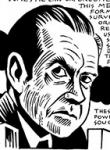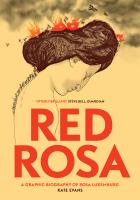.jpg)
There is no way that I am qualified to write a proper obituary for Don Trudell, a longtime member of the British IS/SWP who taught history and media studies at the American School in London (ASL) when I was a student there. I do not know where he was born, or went to college, or even his full name. The last time we spoke was in the early 1980s, and the last time I spent any significant amount of time in his company was when I was still in high school. Although I dined at his house a couple of times, and chatted with him after class on innumerable occasions, I can’t say that we ever became friends. But he was a singular individual and he left an indelible impression on how I think about the world.



 English anarchism has produced a number of fine cartoonists, including Clifford Harper, John Olday, Paul Petard, and, arguably, the artist Hunt Emerson and the writer Alan Moore.
English anarchism has produced a number of fine cartoonists, including Clifford Harper, John Olday, Paul Petard, and, arguably, the artist Hunt Emerson and the writer Alan Moore.

 Wonder Woman was not the first female superhero, but she is the best known of the modern-day costumed heroines. Armed with indestructible bracelets, her Amazonian heritage, and a “magic lasso,” the character’s inaugural debut came in the pages of All Star Comics #8 in December 1941; a month later she was showcased on the cover of Sensation Comics #1.
Wonder Woman was not the first female superhero, but she is the best known of the modern-day costumed heroines. Armed with indestructible bracelets, her Amazonian heritage, and a “magic lasso,” the character’s inaugural debut came in the pages of All Star Comics #8 in December 1941; a month later she was showcased on the cover of Sensation Comics #1.